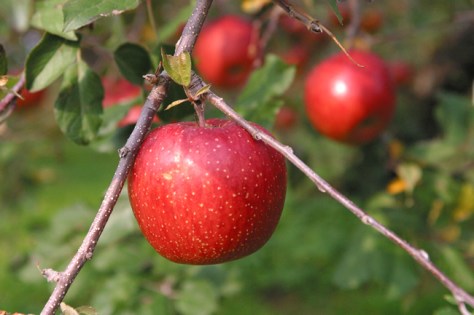As demonstrated by many food bloggers, cooking and creating great foods and drinks have become incomplete and unsatisfying when not considering the benefits or adverse effects of the same foods and drinks regardless of their taste.
I do not intend to delve into counselling or consulting, but only to offer some knowledge about the good sides of Japanese foods and drinks. I will not extoll on its possible lacks and negative aspects. After all, the Japanese are not the longest-living people in the world for no reason!
I will also offr at least one nutritious or healthy recipe at the end of each posting.
Health & Nutrition Facts in Japanese Food 7: Apple/Ringo/林檎
“An apple a day keeps the doctor away!”
Well, the Japanese have taken the precept to the letter, and since the apples were first introduced in this country in the second half of the 19 th Century, they have already created more than 17 hybrids and are still coming with new ones!
The only problem may be that the Japanese do not always eat the skin which contains so many nutrients!
Do remember to wash the apples before you eat them, flesh and skin!
For each 100g (edible parts) it contains:
-Energy: 54 kcal
-Water: 84.9 g
-Proteins: 0.2 g
-Fats: 0.1 g
-Carbohydrates: 14.6 g
-Ash: 0.2 g
-Natrium: 110 mg
-Calcium: 3 mg
-Magnesium: 3 mg
-Phosphorus: 10 mg
-Vitamin B1: 0.02 mg
-Niacin: 0.1 mg
-Vitamin B6: 0.03 mg
-Vitamin C: 4 mg
-Dietary (roughage) fibre: 1.5 g
HEALTH FACTS & TIPS:
-Combined with Pineapple, or with Chickory, or with trefoil, or with yma, will strengthen the digestive system, help prevent cancer and recover from diarrhea and constipation.
-Combined with konyaku/Devil’s Tongue Tuber, or with wakame seaweed, or with enoki mushrooms, or with grapefruit, will will help combat obesity, prevent cancer and help with blood quality
-Combined with kikurage/jew’s Ear mushroom, or with asparaguses, or with onion, or with egg-plant/aubergine, will help lower blood cholesterol, and help prevent heart diseases and cancer.
-Combined with tomato, or with broccoli, or with Qing geng cai (Chingensai/青梗菜 in Japanese), or with nori/dry seaweed, will hlep prevent cancer, will help combat aging, will help recover from illness and prevent obesity.
RECIPE:
Here is a recipe to help lower cholesterol and help prevent heart disease:
Apple: 1 large
Pork: 1 thin cutlet
Garlic: 1 clove (finely chopped)
Salt & pepper: a little
White wine: 1/2 cup/100 cc/ml
Salad oil
Take core out and peel skin (the latter only if you want so!). Cut into thin slices. Cut shallow indents along the cutlet to prevent it from shrinking and curling.
Season cutlet with salt and pepper according to preference.
Heat oil in frypan. Throw in the chopped garlic. Once the nice smell of the garlic comes out add the cutlet and apple and fry.
Fry the pork on both sides until it reaches a satisfactory color.
Add wine, reduce fire to medium and simmer for a while to allow the wine to season the whole!
RECOMMENDED RELATED SITES:
Warren Bobrow, Bread + Butter, Zoy Zhang, Hungry Neko, Think Twice, Frank Fariello, Mangantayon, Hapabento, Elinluv Tidbit Corner, Tokyo Terrace, Maison de Christina, Chrys Niles,Lexi, Culinary Musings, Wheeling Gourmet, Comestiblog, Chronicles Of A Curious Cook, Tokyo Through The Drinking Glass, Tokyo Foodcast, Palate To Pen, Yellin Yakimono Gallery, Tokyo Terrace, Hilah Cooking, More than a Mount Full, Arkonite Bento, Happy Little Bento; 5 Star Foodie; Jefferson’s Table; Oyster Culture; Gourmet Fury; Island Vittles; Good Beer & Country Boys; Rubber Slippers In Italy; Color Food daidokoro/Osaka;/a; The Witchy Kitchen; Citron Et Vanille, Lunsj Med Buffet/Estonian Gastronomy (English), Cook, Eat, Play, Repeat

My first impression of fruit in Japan was that it was ridiculously overpriced. When I looked more closely however, I noticed that, compared to fruit back in Canada, Japanese grown fruit is nearly always bigger and more beautiful. It also turns out to be some of the most delicious I’ve ever had.
Apples in particular are amazing. The sweetness of a good fuji apple is totally worth the price. The only downsides are that they are not great for baking and that they have now spoiled me for anything else. I have always suspected that they had to be healthy as well!
In the future I would love to read your thoughts on other Japanese fruits – and particularly how they are different from fruit you get elsewhere.
LikeLike
Cheers, Nigel!
Sorry for the late reply!
Totally agree with you!
More coming!
Cheers,
Robert-Gilles
LikeLike